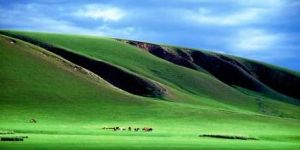Difference between revisions of "Xilin Gol Nature Reserve"
From Wiki China org cn
imported>Superleila |
imported>Ciic |
||
| Line 1: | Line 1: | ||
| + | [[File:Xilin Gol Grassland of Inner Mongolia.jpg|thumb|300px|Xilin Gol Grassland of Inner Mongolia, the largest in China]] | ||
Located in [[Dong Ujimqin Banner]], the 1,078,600-ha '''Xilin Gol Nature Reserve''' offers a typical natural prairie landscape. Established in 1985, it was China's first national nature reserve to protect the prairie ecosystem. | Located in [[Dong Ujimqin Banner]], the 1,078,600-ha '''Xilin Gol Nature Reserve''' offers a typical natural prairie landscape. Established in 1985, it was China's first national nature reserve to protect the prairie ecosystem. | ||
A broad and flat basin among low hills, the place consists of shimmering grass stretching to the horizon broken here and there by river-fed lakes, ponds and brooks. It contains some wetlands, surrounded by patches of grasslands, forests and brush, which are home to many species of wildlife. It is home to 625 species of higher plants, most being superior forage grasses and medicinal plants, many of which are endemic to the [[Mongolian Plateau]]. | A broad and flat basin among low hills, the place consists of shimmering grass stretching to the horizon broken here and there by river-fed lakes, ponds and brooks. It contains some wetlands, surrounded by patches of grasslands, forests and brush, which are home to many species of wildlife. It is home to 625 species of higher plants, most being superior forage grasses and medicinal plants, many of which are endemic to the [[Mongolian Plateau]]. | ||
| − | |||
[[category:tourism]] | [[category:tourism]] | ||
Revision as of 03:31, 12 October 2015
Located in Dong Ujimqin Banner, the 1,078,600-ha Xilin Gol Nature Reserve offers a typical natural prairie landscape. Established in 1985, it was China's first national nature reserve to protect the prairie ecosystem.
A broad and flat basin among low hills, the place consists of shimmering grass stretching to the horizon broken here and there by river-fed lakes, ponds and brooks. It contains some wetlands, surrounded by patches of grasslands, forests and brush, which are home to many species of wildlife. It is home to 625 species of higher plants, most being superior forage grasses and medicinal plants, many of which are endemic to the Mongolian Plateau.
